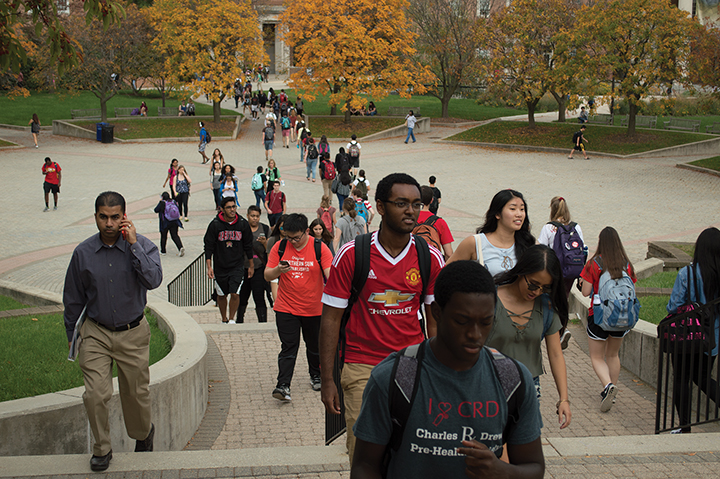Views expressed in opinion columns are the author’s own.
You’ll hear it in so many facets of college life, from imminent plans in Washington, D.C., discussions about dining plans and next year’s housing, comments made in the Commons Shop or the moments that punctuate a decision to grab a bite with a friend: “I’m so broke.”
At a college with such a diverse student body, it’s important to step back and examine just how much some of us tend to fall back upon the “broke college student” archetype, how the overuse use of the phrase has robbed it of gravity and how it avoids a necessary reckoning with class and privilege.
[Read more: Trump’s planned Metro cuts are an attack on low-income students]
In recent years, college costs have ballooned and the value of a degree has risen substantially. Although the majority of Americans do not attend four-year universities, frequently for financial reasons, in the past decade there’s been a push for the economic diversification of student bodies through expanding need-based scholarship and grant programs, as well as a shift toward more holistic application processes.
The reality of campus economic diversity poses a complex and layered challenge to how we talk about wealth and class.
At this university, many students who do not carry the expectations of paying tuition, of contributing to their families’ income, of working many hours or even some, continually proclaim to be “broke.”
Being “broke” isn’t synonymous with having limited spending money, or a low balance in your bank account. The issue here isn’t the amount of funds, but what happens when it runs out.
All of this isn’t to claim that anyone’s financial landscape is without barriers in some shape or form. But the language at play conflates economic hardships of vastly different severity.
In many contexts, there is a trivialization — and, to a degree, fetishization — of the “broke college student” trope. And with a student body that is, for the most part, comparatively affluent, language-orbiting discussions of money can often be misleading or misunderstood.
When one colloquially says “I’m broke,” but really means “I shouldn’t spend money,” students who are struggling to make ends meet — a population that is often erased from the dominant university worldview — is further alienated from the culture of insulation and wealth that imbues and informs universities like this one.
[Read more: American philanthropy neglects the global poor]
One doesn’t need to say they’re hyperbolically “broke” if their true intent is to simply be parsimonious. Recognizing the weight that difference carries is fundamental to beginning conversations about privilege and wealth.
Claiming to have nothing doesn’t, in any context, validate the fact that people should be cognizant of what they’re spending, or perhaps just realize they can’t always do everything.
For those of us who can — and should — recognize our privilege, we must begin to critically examine the language and phrases we use. Let’s replace phrases like “I’m so broke” with “I’m trying to save money,” or simply, “I just don’t want to spend any money.”
Sarah Riback is a sophomore English and sociology major. She can be reached at riback.sarah@gmail.com.



